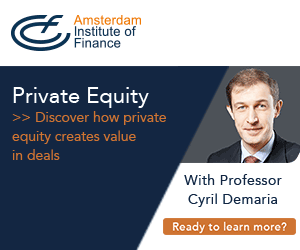Private equity specialist Cyril Demaria will share knowledge and insights on the full value chain of this sector.
“If you decide to put money into your niece’s start-up, what you are doing is investing venture capital. That’s private equity,” says private equity specialist Cyril Demaria. “It’s as old as Babylonian times, but until about 20 years ago, nobody really knew what private equity was. Most of the tools we know today have been around for a very long time, but now the industry has seen a fast-paced professionalization and breakneck innovation.”
Cyril, who lectures at top academic institutions around the world, will be presenting a 3-day Private Equity program at Amsterdam Institute of Finance in September 2020.
Perhaps more than most financial markets, private equity is the subject of a great deal of misinformation and misunderstanding, he says. “Private equity has had a meteoric rise, and this has generated fear and anxiety. It is also very topical and tends to be in the news – more so than other aspects of finance. That’s where this program is useful – in helping people to understand the tools available, the pros and cons, and how to use them.”
Stability
The private equity market – like all aspects of life and work – will be affected by the fallout of the COVID-19 crisis. “Private equity thrives on movement; stability or stillness is what kills it. You have stillness when people are totally content or totally scared,” says Demaria. “It becomes very challenging to know what a company is worth. Price is based on what’s going on around you. You can go to a flea market on a Saturday morning, and you look around the market and get a sense of the price of the piece you are interested in buying. We look at the stock market indirectly to price our assets, and that is now very volatile. It would be very difficult, for example, to price a hotel chain at the moment. There will be operational losses in this industry. We don’t know how much, and we don’t know for how long. But there might also be opportunities. When businesses struggle, the ones that survive gain market share. There will be opportunities in certain sectors like healthcare, for example. With so much flux, most people just wait and see, and transactions might be cancelled, suspended or repriced. Private equity operators continue to invest and thrive.”
Having worked in the venture capital industry in 2000-2002 and in finance throughout his 20-year career, Demaria says, “in the last crisis, consequences were different from what we expected, in both positive and negative ways. It will be the same now, I think. The content of what I teach has been through changes and updates over the years, but I know what is going to be constant. The content is reflecting the state of the art in the sector.”
Private Equity course
The Private Equity program is broad and comprehensive. “Many courses focus more narrowly, for instance, on MBO and the technicalities and formulas around that. We designed this course to give a full 360-degrees perspective on the topic, so people can plug into that knowledge and leverage it in their own work,” he says. Overall, it gives a solid and critical understanding of the inner workings of venture capital, growth capital, buyouts and turnarounds, including the operation of private equity funds, reporting and performance measurement, and the institutional investor perspective.
Demaria describes the course as “a kind of structured conversation with people who want to learn”. He says, “It’s very stimulating with a lot of hands-on business cases. The way I think about it is that when you drive, you have mirrors to guide you, but there are dead angles, places the driver can’t see, so they might not have all the information. And there might be assumptions they are making, perhaps about the speed of another car. Having done a lot of different things in the private equity and having experienced the full value chain of the sector, I notably help them check these blind spots and assumptions.”
He adds that the attendees add tremendously to the course. “You get a very interesting mix of participants, and their knowledge and work experience contributes to making it an interesting and stimulating class.”
